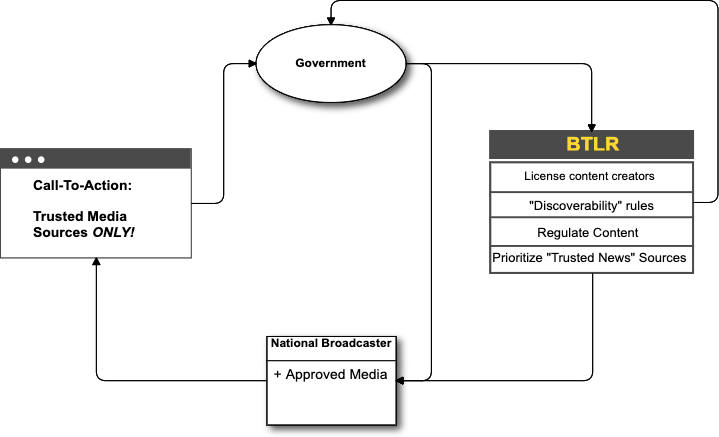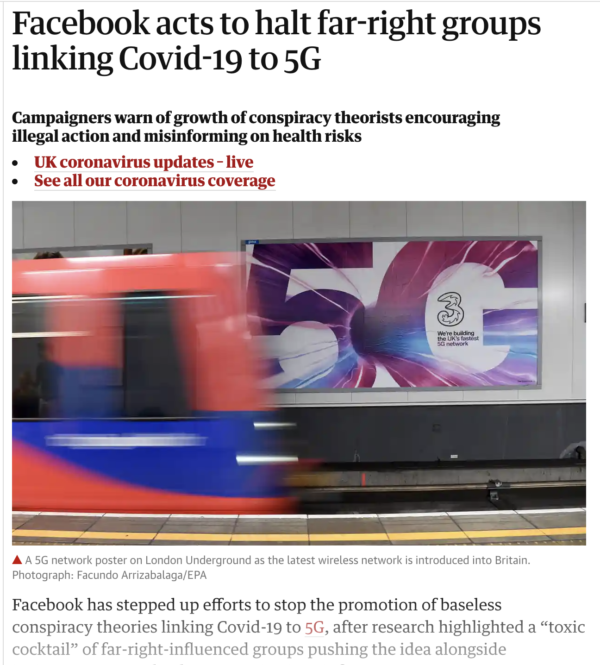What’s The Difference Between Fake News & Hypernormalisation?
Submitted by Mark E. Jeftovic of EasyDNS
Before the current Coronavirus pandemic, the Canadian government took delivery of the Broadband Telecom Legislative Review. The 235-page report offered 97 recommendations for revamping internet and broadcasting oversight, most of them bad ones. Among them were provisions for requiring all content creators to obtain a license for operating from the government and “discoverability provisions” to force major tech platforms to emphasize “credible sources of news” over others (what the government calls “Approved Media”).
I wrote an article about it at the time and tabled a petition into the House of Commons to call on the government to reject BTLR in it’s entirety (still open, so please sign and share). More recently the Internet Society Canada Chapter (of which I’m a board member) submitted a point-for-point critique of the framework (it’s not on the site yet, will link when it is).
Shortly after that the government-funded CBC marshalled a gaggle of “Approved Media” in Canada (no doubt one of entities who will receive part of that $600,000,000 subsidy package announced in the run up to the last election) to call forth the government to legislate “trusted sources” of news…..
If you’re with me so far, the logic flows like this:
The latest beat in this march toward CCP-style control over the narrative is the federal governments’ latest declaration that “they are open to new laws against spreading pandemic misinformation”
The federal government is considering introducing legislation to make it an offence to knowingly spread misinformation that could harm people, says Privy Council President Dominic LeBlanc.
Rex Murphy was quick out of the gate with a scathing criticism of the idea, drawing the quite apt parallel to the similarity any Canadian legislation to control the narrative would be the same as the Chinese Communist Party’s total control in that country, and we see firsthand the horrors that causes.
There is already a government that has that power, and in some cases brutally exercised it. That is the government of the Communist Party of China.
And what did it do with that power? It barred telling the truth about COVID-19, and instead told lies about it. On the where it happened, when it happened, how it happened and how it spread, the Chinese government confounded, confused and lied about a plague that has now hobbled the whole planet. And China “officially reprimanded” the doctor who initially tried to warn people about the coronavirus, and who, with dread irony, actually died from it.
(emphasis added)
The pretense around “preventing misinformation about Coronavirus” is appealing to governments everywhere as they use the age old “never let a good crisis go to waste” to attempt to tighten their control over their respective populations.
Dominic Leblanc cites British MP Damian Collins’ moves in a similar direction in the UK.
LeBlanc told CBC News he is interested in British MP Damian Collins’s call for laws to punish those responsible for spreading dangerous misinformation online about the COVID-19 pandemic.
Collins’ is the impetus behind Infotagion, a new website that purports to be a dispassionate, neutral arbiter of what is and isn’t “fake news” (incidentally, Collins was also a staunch “Remainer”, pushed for a second Brexit Referendum and was calling for an investigation into “Russian Meddling” around the Brexit vote).
What is troubling about this peleton of governments and incumbent mainstream media outlets singing in harmony about the need to control “misinformation” is that in a fast moving situation like this, it is impossible for anybody to say for sure what the truth actually is.
Will Luc Montagnier lose his Nobel for saying COVID-19 came from a lab?
Zerohedge was kicked off of Twitter for investigating whether Coronavirus originated in a Wuhan lab. This line of inquiry has since moved mainstream, with numerous US lawmakers and scientists saying it is possible. Among them is Luc Montagnier, the man who won a Nobel Prize in 2008 for his discovery of HIV, who says that COVID-19 is a man-made virus that came out of a lab. This is largely unreported in mainstream media and French language media are dutifully accentuating the naysayers.
What is more disturbing to me is the pejorative timbre of mainstream media criticisms toward unapproved narratives and conflating them with politically tinged ideology in order to marginalize orthogonal thought.
The hot-button 5G / Coronavirus theories are a good example. Originally that “conspiracy theory” took hold as “5G suppresses immune system, furthering the spread of Coronavirus”. But when I see mainstream media lambasting “baseless 5G conspiracy theories” it is then framed with the added notion that “people think the virus spreads via 5G radio waves”.
I haven’t seen anybody in any tin-foil hats actually making that claim (but to be honest, I haven’t gone looking for that either).
My suspicion, my worry, is that the mainstream media is juicing up the 5G conspiracies to make them more absurd, what’s worse, they are then framing them with other pet boogymen to conflate all non-conformist thought.
The screen grab is from this article in The Guardian, while this Media Matters column about the conspiracy theories around Bill Gates (who did, undeniably, call for a national tracking system to monitor individual vaccination status in a recent Reddit AMA) frames any hysteria over government overreach as exclusively a far right, far white movement:
During this time, conspiracy theorists, anti-vaxxers, white nationalists, and supporters of the QAnon conspiracy theory have spread a baseless conspiracy theory on multiple social media platforms, far-right sites, and message boards claiming that Gates’ effort to help develop a vaccine is some kind of nefarious attempt to control, follow, or even depopulate the world’s population via a “microchip” of some sort
Whenever you see news articles that use words like “baseless” and “unfounded”, without adding contextual data or underpinnings to back that up, they add to a widening suspicion amongst the general populous, one that may explain why nearly all of them are failing financially amid plummeting audiences. It’s the suspicion or realization that mainstream media outlets, especially the government funded ones, are just as agenda driven as the most outlandish shock-jocks in tin foil hats.
They sound like The Pravda.
When a populist like Donald Trump rails about #FakeNews, he isn’t making something up out of the blue and ramming it down the throats of his mindless followers, inducing some undeserved crisis of faith in the venerable integrity of major news outlets, one that otherwise wouldn’t have occurred.
It works because he’s hitting a nerve. He’s tapping into a subconscious pool of distrust and cynicism at an institution that routinely cheerleads monumental lies (like WMD in Iraq) and then enjoys immunity from accountability in doing so.
It is the increasing realization that what we call the mainsteam media today is the essential scaffolding for the hypernormalisation that has set in here in the west (hypernormalisation is the construction of an institutionalized pretext that a failing societal structure is still functioning as expected).
in the Soviet Union [everybody] knew the system was failing, but no one could imagine an alternative to the status quo, and politicians and citizens alike were resigned to maintaining the pretense of a functioning society. Over time, this delusion became a self-fulfilling prophecy and the fakeness was accepted by everyone as real, an effect that Yurchak termed hypernormalisation.
The above outline is taken from Wikipedia. The term was coined by Soviet dissident Alexei Yurchak and later made into a documentary by British filmaker Adam Curtis.
In the next installment I’ll tell you about the times mainstream media here in Canada tried to recruit me into participating in the construction of purely fabricated “news stories”. It’s the reason why I stopped giving media interviews after 2010. And we’re not talking fringe “indie” elements either, in the follow-up post I’ll tell you about two incidents involving the CBC and Global News.
Sign up to AxisOfEasy or follow us to stay in the loop
Tyler Durden
Sat, 04/18/2020 – 11:25

